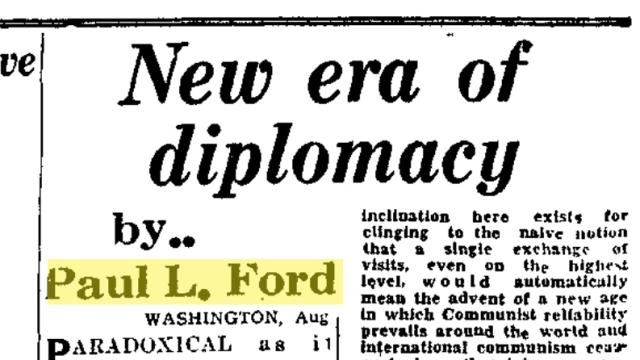Back in the 1950s and 60s, the American government’s foreign propaganda arm, the U.S. Information Agency (USIA), invented fake names for journalists to plant stories in newspapers. In 2016, I wrote about Guy Sims Fitch, just one of the pseudonyms that was used globally. But I recently stumbled upon a few more names that might be helpful for people interested in Cold War history.
The names I’ve discovered:
-
Thomas Marshall
-
Gilbert Grant
-
John Kerigan
-
Benjamin West
-
Norman Smith
-
Paul L. Ford
The USIA planted stories using fake names in countries like Brazil, Germany, Jamaica, Australia, and others where the U.S. had an interest in spreading its own version of events. The USIA denied working with American intelligence agencies, but evidence has since emerged that the leaders of the organisation, including Edward R. Murrow from 1961 until 1964, were consulting with the CIA.
One example of a planted news story from the August 26, 1959 issue of the Kingston Gleaner newspaper in Jamaica, written by “Paul L. Ford,” provides a fascinating peek at how the USIA was conducting propaganda operations abroad.
In late August of 1959, President Eisenhower had just proclaimed that he was considering giving aid to Laos to combat what the U.S. said was a communist incursion funded by the Chinese and the Soviets. The article by “Ford” insisted that Eisenhower’s decision made perfect sense.
From the August 26, 1959 issue of the Kingston Gleaner:
Paradoxical as it may sound, the recent State Department comment on the outside backing for the Communist insurrection in Laos serves as an excellent explanation of Washington’s attitude towards the new era of diplomacy which will open with President Eisenhower’s Bonn-London-Paris trip this month and USSR Premier’s Khrushchev’s visit to the United States next month.
In normal times, the Laos statement would have been almost routine as outside influences have always been at work among Laotian Communists and are unquestionably at work again in generating Communist military activity there. But when restraint in criticising Communists would seem to be a way for seeing the scene for Khrushchev’s United States visit, it is certainly a noteworthy bit of timing for the State Department to utter formally and outspokenly the suspicion that (1) Moscow itself—not just North Vietnam—may be behind the Communist insurrection in Laos; and (2) that the insurrection may in fact be part of a broader Communist design. To which President Eisenhower, in his news conference, cautiously but firmly added that he would certainly take up Laos and any similar incident of Communist-inspired activity in his forthcoming talk with Premier Khrushchev.
All this goes to show how little inclination here exists for clinging to the naive notion that a single exchange of visits, even on the highest level, would automatically mean the advent of a new age in which Communist reliability prevails around the world and international communism ceases to be a threat to anyone.
The fact of the matter is that Washington remains realistic, alert and unwilling to appease Moscow or to divid the world on the patter of the Ribbentrop-Molotov Pact, which happened to be concluded 20 years ago this month and divided North-Eastern Europe into Nazi and Soviet “spheres of influence.”
However, what is now nearing the stage of serious experimentation is a new direct kind of U.S. diplomacy born of a realisation that has long been germinating in Washington.
Readers in Jamaica had no idea they were reading the work of an official U.S. propagandist. For all anyone in Jamaica knew, Paul L. Ford was just another reporter in Washington, D.C. who wasn’t on the government’s payroll.
The USIA was dissolved in 1999, though the U.S. government still funds an organisation called the Broadcasting Board of Governors (BBG) which produces media for foreign consumption. Back in January of 2017, Clapper argued that the U.S. needs a new propaganda agency specifically to combat Russian disinformation.
So far, I’ve only tracked down one person who worked at USIA who was writing under pseudonyms. Wes Pedersen, a former USIA employees, spoke to Sioux City Journal reporter Lynn Zerschling in 2005 about his use of fake names but he died in 2013. I’ve filed Freedom of Information Act (FOIA) requests with the FBI and CIA to see if I can find out more, but the CIA denied my request for information on Guy Sims Fitch back in 2016. The reason? The agency cited privacy laws. For a made-up person.
